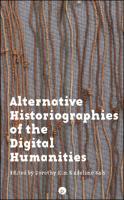Alternative Historiographies of the Digital Humanities
| dc.contributor.editor | Kim, Dorothy | |
| dc.contributor.editor | Koh, Adeline | |
| dc.date.accessioned | 2021-06-23T09:48:02Z | |
| dc.date.available | 2021-06-23T09:48:02Z | |
| dc.date.issued | 2021 | |
| dc.identifier | OCN: 1257762953 | |
| dc.identifier.uri | https://library.oapen.org/handle/20.500.12657/49672 | |
| dc.description.abstract | "In Silencing the Past: Power and the Production of History, Michel-Rolph Trouillot writes that by examining the process of history we can “discover the differential exercise of power that makes some narratives possible and silences others.” Alternative Historiographies of the Digital Humanities examines the process of history in the narrative of the digital humanities and deconstructs its history as a straight line from the beginnings of humanities computing. By discussing alternatives histories of the digital humanities that address queer gaming, feminist game studies praxis, Cold War military-industrial complex computation, the creation of the environmental humanities, monolingual discontent in DH, the hidden history of DH in English studies, radical media praxis, cultural studies and DH, indigenous futurities, Pacific Rim postcolonial DH, the issue of scale and DH, the radical, indigenous, feminist histories of the digital database, and the possibilities for an antifascist DH, this collection hopes to re-set discussions of the straight, white origin myths of DH. Thus, this collection hopes to reexamine the silences in such a straight and white masculinist history and delineates how power comes into play to shape this straight, white DH narrative. A number of the pieces in this volume go back to the origin myth of the digital humanities to reassess the hagiography of Father Busa by reconsidering and recontextualizing his legacy and his work in relation to media archaeology, politics, Cold War maneuvers, mechanized genocide, the Third Reich, and the military-industrial complex as it has organized various fields, including Asian Studies. This reassessment of comparative genealogies — vis-à-vis Foucault — undergirds an alternative history of the Jesuit hagiography we have so far been unwilling to reexamine for its narrative use in embellishing an origin hagiography/historiography for digital humanities. Other pieces intertwine the digital humanities with other fields — area studies, Asian American Studies, cultural studies, literary studies, and environmental studies — in order to reexamine how the intersections and juxtapositions reveal silences in these histories. And finally, a number of pieces considers alternative praxes in rethinking these histories, whether it is an essay that is a game or a reevaluation of feminist media praxis." | en_US |
| dc.language | English | en_US |
| dc.subject.classification | thema EDItEUR::U Computing and Information Technology::UB Information technology: general topics::UBW Internet: general works | en_US |
| dc.subject.classification | thema EDItEUR::J Society and Social Sciences::JB Society and culture: general::JBC Cultural and media studies::JBCC Cultural studies | en_US |
| dc.subject.other | cultural studies, digital humanities, feminism, indigenous studies, postcolonialism, queer gaming, radical media | en_US |
| dc.title | Alternative Historiographies of the Digital Humanities | |
| dc.type | book | |
| oapen.identifier.doi | 10.53288/0274.1.00 | |
| oapen.relation.isPublishedBy | 979dc044-00ee-4ea2-affc-b08c5bd42d13 | en_US |
| oapen.relation.isbn | 9781953035578 | |
| oapen.collection | ScholarLed | en_US |
| oapen.pages | 512 | en_US |
| oapen.place.publication | Brooklyn, NY | en_US |

